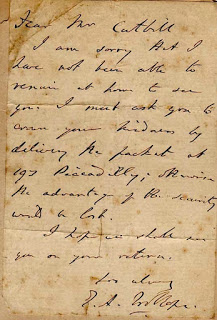While many admirers of Anthony Trollope are busy celebrating the great novelist’s bicentenary, spare a thought for his older brother, Thomas Augustus Trollope (1810 – 92), who was always in his shadow, but who as a novelist, prolific travel writer and biographer in his own right, may have eclipsed Anthony in the word stakes.
In a long literary career Thomas published around sixty books, having begun a writing partnership with his mother while still at Oxford? In addition, he was a prodigious contributor to magazines. His friendship with Dickens, for instance, led to a long association with Household Words. Much of his work was achieved while living in some style in Italy. He moved to Florence in 1843, creating with his first wife a salon for expatriates at the Villino Trollope, which was expertly decorated and whose sumptuous furnishings included a library of 5,000 books.
From here he migrated to Rome, where with his second wife, the writer Frances Trollope, he established another refuge for the expatriate community.
 In this short undated letter Trollope apologises to a Mr Cutbill for not being ‘ able to remain at home’ to see him, and suggests that he instead delivers a ‘ packet ‘ to number 193, Piccadilly, ‘ otherwise the advantage of the scarcity would be lost ‘.As the address in question was that of Trollope’s publishers, Chapman and Hall, and if the letter dates from the period before he left for Italy, this packet may have contained some literary material of interest to the writer, but equally, it could have been something perishable which may have spoiled if Cutbill, who was away from home at the time, had waited until his return to present personally to Trollope.
In this short undated letter Trollope apologises to a Mr Cutbill for not being ‘ able to remain at home’ to see him, and suggests that he instead delivers a ‘ packet ‘ to number 193, Piccadilly, ‘ otherwise the advantage of the scarcity would be lost ‘.As the address in question was that of Trollope’s publishers, Chapman and Hall, and if the letter dates from the period before he left for Italy, this packet may have contained some literary material of interest to the writer, but equally, it could have been something perishable which may have spoiled if Cutbill, who was away from home at the time, had waited until his return to present personally to Trollope.
This latter possibility seems unlikely. We simply don’t know what Trollope meant by ‘the advantage of the scarcity’, but if the package did indeed contain a perishable gift from Cutbill, perhaps Trollope felt that his publishers would be best placed to look after it until he returned to claim it.
[R.M.Healey]
